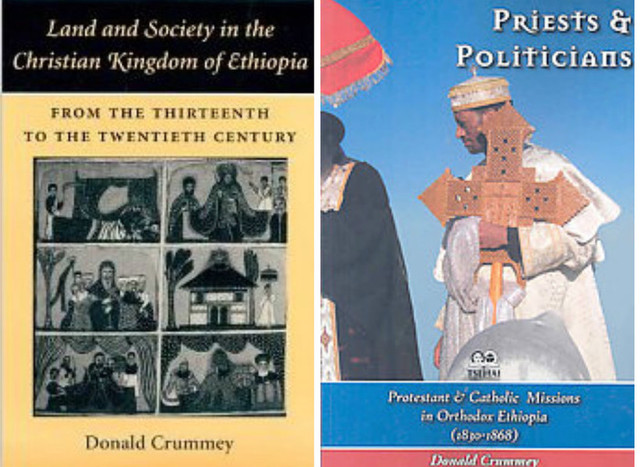 Professor Donald Edward Crummey died on Friday, August 16th, 2013 at age 72. He began his research and teaching career in Ethiopia where he worked at Addis Ababa University from 1967 to 1973.
Professor Donald Edward Crummey died on Friday, August 16th, 2013 at age 72. He began his research and teaching career in Ethiopia where he worked at Addis Ababa University from 1967 to 1973.
Obituary
By Bahru Zewde
Published: Thursday, August 29, 2013
“There is one fewer of us now, and we were never many to start with!”
That was how Don conveyed to me the passing away of Taddesse only last May. A loaded sentence which had a premonition of his own frail condition, as he was battling the cancer that eventually claimed his life. But, few of us thought that his departure would be so imminent, following fast on the heel of Taddesse’s. Donald Crummey passed away in Urbana, Illinois, on Friday 16 August, 2013.
The sentence also highlights the merciless assault that Death has chosen to inflict on those who have dedicated their lives to the study of Ethiopian history – beleaguered as it is in many other respects as well. In the past decade alone, we have lost so many of our professional colleagues – Harold Marcus, Berhanou Abebe, Zewde Gebre Sellassie, Merid Wolde Aregay, Hussein Ahmed, Taddesse Tamrat – and now Don Crummey.
Taddesse’s and Don’s lives were intertwined in so many ways. They were more or less contemporary doctoral students at the School of Oriental and African Studies of London University in the mid-1960s – the golden age of African studies. They both did their research on the interplay of religion and politics – as can be seen from their dissertations, which were both published in the same year (1972) by Oxford University Press, Taddesse’s as Church and State, Don’s as Priests and Politicians. They also had a common daughter – Hiwote Taddesse Tamrat, biological daughter of Taddesse and Almaz and adoptive daughter of Don and Lorraine. Both Taddesse and Don were adoring husbands and loving fathers, blessed with three children each and with a number of grandchildren.
My memory of Don takes me nearly five decades back – to 1967, when he joined the Department of History of Haile Sellassie I University, as Addis Ababa University was then known. I was then a third year student. He had come fresh from his doctoral studies at SOAS. He was preceded by Richard Caulk, who had joined the Department in 1966. Both of them were members of that generation of African and Africanist historians who were to transform the teaching and research of African history all over the continent. As it happened, both had as their supervisor at SOAS the great and amiable scholar of Southern Sudan, Richard Gray.
Richard and Don left – in different ways – lasting imprint on my generation of Ethiopian historians . On the surface, one could not think of more contrasting personalities – Richard tempestuous and unsparing, Don more sedate and understanding; Richard clean-shaven and Don with his trademark patriarchal beard. This last feature could hardly escape the notice of the traditional painter who was commissioned to paint the staff members of the Department in the early 1970s; the painting still hangs in the Department chairperson’s office.
The Senior Essay – the mandatory thesis that students had to write for their BA – was the medium through which they imparted their methodological skills to their students. The result was a crop of outstanding BA theses, many of them on the thitherto ignored southern part of the country, mostly written by systematically tapping oral sources. Quite a few of them were comparable to MA theses in many other universities. This breakthrough in Ethiopian historiography – a veritable methodological revolution – was to continue into the early 1970s.
It was also during his stay at Haile Sellassie I University that Don was to turn his attention, from the vantage point of his doctoral research, to understanding the enigmatic figure of Emperor Tewodros. The result was two influential articles on his policy and personality – his modernizing zeal and his violence – which appeared, respectively, in the Journal of African History and the Journal of Ethiopian Studies.
Don and Lorraine were generous hosts during their stay in Addis Ababa, inviting students and colleagues to sumptuous meals at their homes. For some reason, the thing that always sticks in my mind is the Renault 4 that Don used to drive – an intrepid machine that traversed long distances throughout the country without a hitch. It became as much his trademark as his beard. Long after he left Addis, Don also recalled on so many occasions the scary mid-night drive down what was popularly known as “the question mark” – the tortuous road going down from Fit Bar (the man gate of the Menilek Palace) to where Sheraton Addis is standing today – as he was rushing to Princess Tsehay Hospital while Lorraine was in labour to give birth to their third child, Naomi.
In 1973, Don left Haile Sellassie I University for the institution that was destined to be his permanent academic home – the University of Illinois at Urbana-Champaign (UIUC). For four decades thereafter, he was to use that base to lead a fruitful and successful academic career, rising to full professorship at the Department of History in 1983 and serving as Director of the Centre for African Studies from 1984 to 1994. Indeed, it was under his directorship that the Centre, after graduating from a program to a centre status, attained a pre-eminent position in the league of such establishments in the United States.
His teaching and research at UIUC left an even more enduring impact. His undergraduate teaching, where he created and developed six of the over twenty courses that he taught, earned him the Distinguished Teaching Award of the College of Liberal Arts and Sciences in 1987 and the Humanities Award for Excellence in Teaching in 2006 of the same college. But it was through his supervision of doctoral theses, which continued after he became Emeritus Professor in 2006, that his legacy would remain with us. He supervised fourteen PhD dissertations between 1986 and 2011, eight of them on Ethiopian topics and six of these by Ethiopian students. As it happened, both his first and his last student were Ethiopian (Abudssamad H. Ahmad and Habtamu Mengiste, respectively).
He also broadened his African links by developing a collaborative research and training arrangement with Egerton University in Kenya. While Director of the Centre for African Studies, he created a study abroad program for undergraduate and graduate students of that university. Indeed, three of the PhD dissertations he supervised were to be on Kenya, two of them by Kenyans.
But it was Ethiopia, where he conducted two seminal research projects, which remained the primary focus of his research. The first was the land tenure project in Gondar and Gojjam. Apart from helping to uncover a corpus of rich documents that throw new light on the land tenure systems of the concerned regions, the project helped to train two of his PhD students – Shumet Sishagne and Daniel Ayana. The project was rounded off with a magisterial work on the history of Ethiopia’s land tenure, Land and Society in the Christian Kingdom of Ethiopia: From the Thirteenth to the Twentieth Century (2000).
The second project, done in collaboration with the Institute of Ethiopian Studies, was a reassessment of the environmental history of northern Ethiopia, focusing on Wollo. Don was able to set up an impressive multi-disciplinary team, involving a geographer, two historians, a development analyst and a botanist. In addition, the project benefited from short-term visits of experts in ancillary disciplines. The preliminary findings of the research were published in 1998 in a special issue of the Journal of Ethiopian Studies. While the other members of the team then went on to pursue other projects, Don continued to broaden those findings into yet another seminal study of the environmental history of Ethiopia. Alas, he succumbed to the illness that had been diverting his attention of late before that book could see the light of day.
Donald Crummey was the winner of many awards and research grants, including an NEH research grant for his land tenure project, grants from the Macarthur Foundation for the planning and execution of his environmental history project, as well as Fellowships from Fulbright and the National Humanities Center. He has authored two major books on Ethiopian history, co-edited five works on African history, in addition to publishing over fifty articles and dozens of contributions to the Hamurg-based Encyclopaedia Aethiopica, of whose editorial committee he was also a member. A dedicated reviewer of books for many journals, particularly the Journal of African History, he has some sixty-five reviews to his credit. He was also a regular and active participant of the International Conference of Ethiopian Studies series, serving as the North American representative of its International Organizing Committee from 1882 to 1888.
At the onset of his illness, Don used to keep his friends and colleagues updated with a regular health bulletin. But, apparently as his condition assumed a serious turn, he gave up that habit. So, his departure must come as a shock to many.
Donald Crummey is survived by his wife, Lorraine, his three children Rebecca, Matthew and Naomi as well as his five grandchildren Zoey, Siobhan, Valentin, Willa and Inigo. He is going to be sorely missed not only by his immediate family but also by his former students and colleagues as well as the Ethiopianist community at large.
May his soul rest in peace.
—
Related:
Donald Crummey (The News Gazette)
Join the conversation on Twitter and Facebook.

























